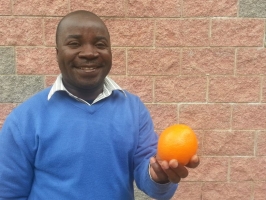An interview with Carsterns Mulume, National Director of CADECOM, the Catholic Development Commission in Malawi (Caritas Malawi) by Caritas Internationalis Communications Officer Laura Sheahen

Carsterns Mulume, National Director of CADECOM, holds an orange while at a ‘Food for All’ meeting in Rome, Italy. Credit Laura Sheahen/Caritas
When you were growing up in Malawi, what was the hunger situation like?
We were a family of nine children. When you’re a child, normally you expect breakfast. You expect food. And it wasn’t there. My mother wanted to provide food, but it was common in my case to go to school without breakfast. One or two days a week we’d have it, but most of the time, we’d go to school on an empty stomach. This was true of most of the other children.
Was there food at school?
Our primary school didn’t have a free lunch meal. If you went to school with an empty stomach, unless your parents gave you a small amount of money, you came back with an empty stomach.
We had two breaks at school. Your friends who had money would go and buy food. You’d be looking at them while they ate. That made you feel more hungry. There wasn’t enough to share. Sometimes they shared, but sometimes they didn’t.
Then you’d go home and not find food. Our kitchens are like an open space–you go and expect to find fire, something cooking. You realise, there’s no food again.
That was the most painful thing—to go to school hungry, see your friends eating, and then come back home and find there is no food.
You have no one to blame. Your parents are trying their best.
How did your parents earn a living?
The problem was to produce the food. My family has land. My parents would go to the field to farm. They tried to grow maize, beans, sorghum, cowpeas. But because of continuous farming, the soil was poor. The only way to get crops was to use fertiliser, and that was expensive. It was about 3 dollars in today’s dollars. But we didn’t have that. It was impossible.
Can you tell me about a particularly bad year?
There was one bad year I remember. Food ran out four months after the harvest. My mother had to farm someone else’s field. My father had to go work as a security guard on one of the plantations. I felt bad because he had to leave at 5 pm, stay awake to guard the plantation, then come back in the morning tired, all to buy food for the whole family.
When people wake up, they think of food, nothing else. During the day we would fend for ourselves, plucking food from a tree—mangoes, guavas. Then at night we might have porridge.
Can you tell me about some other people who were hungry?
My grandmother was very loving. I remember one day I had some food—I think it was a boiled potato. She and her friend were there. I came with the potato and gave some to my grandma. She said, “Give some to her too.”
She also helped an old man who we were keeping in our home. She would take a portion of food and give it to him. She did this every day. She had compassion, she had love.
Did you make it through school, despite the food issues?

CADECOM (Caritas Malawi) trains small farmers on planting, irrigation, and market techniques so they can grow more food and earn money from their crops. Photo by David Snyder/CRS
Studying on an empty stomach is hard. You can’t concentrate. You need strong parents to encourage you.
My mother was a strong Catholic. She’d pray the Our Father. And she’d say, “Go to school! Go to church!”
I went to secondary school. Most of my classmates did not. When I finished secondary school, they were announcing on the radio the results of who would go to college. I was sitting there nervously, listening. My name came up, and my grandmother jumped up and clapped.
The family continued to suffer from hunger. When I would come back from college, they’d say, “We have no food. But give some food to Carsterns. He’s used to eating daily.” I was worried about my younger brothers.
Another brother who was assisting me to pay school fees. That brother died. The only way to thank him was to support his daughter. Her mother died and she was alone. So I support her.
Can you tell me about a person that CADECOM helped?
I remember an old woman in her 90s. She lost her three daughters and was caring for nine orphans. A programme sponsored by Caritas Australia helped her with seed, fertiliser, and training, and also dug a well nearby.
I visited her. She actually hugged our field worker. She said, “How would I feed these orphans without CADECOM?”
What inspires you as you work on food issues for Caritas?
I know there’s an opportunity to turn things around. The land is there. The people are willing to work. They say, “The government shouldn’t give us food. We have the land, the energy.” They have not given up. That inspires me. If you came to Malawi, you’d be amazed at how people have not given up.
In April 2014, Carsterns Mulume and other Caritas leaders gathered in Rome to discuss best practices for ending hunger. The meeting was partially funded by the U.S. Embassy to the Holy See.
